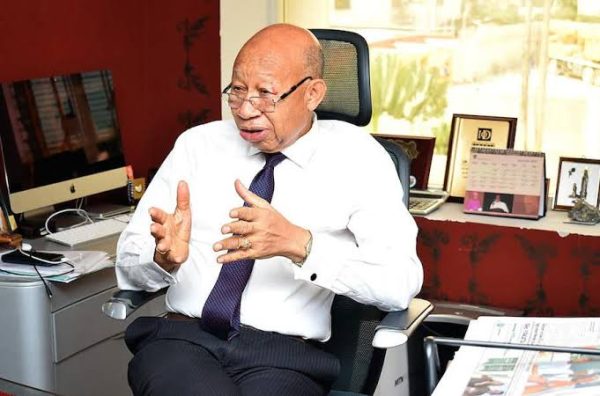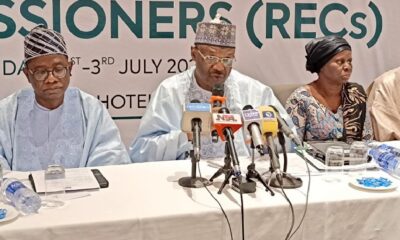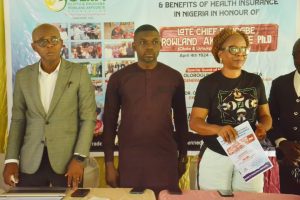News
5-Point Agenda For New CJN by Eminent Nigerian Lawyers

…By Ernest Ojukwu, SAN; Sam Erugo, SAN; Chidi Anselm Odinkalu; and; Mbasekei Martin Obono
Amid the greatest crisis of judicial authority since Nigeria’s independence in 1960, President Bola Ahmed Tinubu on 23 August 2024 swore in an Acting Chief Justice of Nigeria (CJN). For the new Chief Justice, this challenge is also an opportunity to articulate an agenda for reform that can restore public trust in the judiciary. Such an agenda must address the following:
(a) ensuring merit-based judicial appointments;
(b) addressing the problem of abuse of interim injunctions, ex-parte orders, and conflicting judgements;
(c) enhancing judicial discipline and accountability;
(d) addressing the crisis of political cases, election petitions, and judicialisation of politics; and
(e) reform of the Supreme Court.
1.JUDICIAL APPOINTMENTS*
The National Judicial Council (NJC), which oversees judicial appointments and is led by the CJN, has been severely criticised for mishandling judicial appointments. In 2020, for instance, it authorised 15 vacancies for the Federal Capital Territory High Court but nominated 34 for appointment.
The NJC has also been accused of retrenching its Procedural Rules for judicial appointments, thereby undermining merit-based appointments; compromising judicial integrity; and breeding a loss of confidence in the judiciary.
Against this background, it is of the utmost importance that the new CJN commits explicitly to a policy of restoring integrity and merit to judicial appointments through the introduction of transparent processes of advertisement of vacancies; nomination of candidates, interviews, short-listing, and selection.
2.CONFLICTING JUDGEMENTS AND ABUSE OF INTERIM INJUNCTIONS
Rule 3 (3.5) of the Judicial Code of Conduct provides that “a Judicial Officer must avoid the abuse of the power of issuing interim injunctions, ex parte.” Although the standards governing interim injunctions are very well established in Nigeria, these are often either disregarded or abused without consequences.
Equally, courts of co-ordinate jurisdiction routinely issue conflicting orders that seem almost calculated to damage the institution of the judiciary.
It is suggested that:
(a)Priority should be accorded to monitoring and reporting interim or ex parte orders by trial judges. There should also be clear consequences attached to a breach of the Judicial Code of Conduct.
(b)Judicial appraisals should be both quantitative and qualitative. Accordingly, they should proactively address evidence of ethical deficits in the work or output of judges, focusing on adherence to ethical guidelines and the quality of judicial decisions.
(c)There should be clear Practice Directions on the management of jurisdictional overlaps. The structure and scope of such overlaps should be discussed at the All Nigerian Judges Conference and the Practice Directions should be uniform across all the court systems in the country.
(d)The NJC should establish a central database or easily searchable platform for judges to share information on ongoing cases.
3.DISCIPLINE AND ACCOUNTABILITY
Preserving the dignity and integrity of the judiciary hinges on upholding discipline and accountability which is in turn essential for preserving the institutional authority of the judicial branch. If the judiciary lacks credibility, its authority suffers irredeemably.
Tragically, this eventuality may already be upon us. A recent survey by the United Nations Office of Drugs and Crime (UNODC) and the National Bureau of Statistics (NBS) finds the judiciary as the recipient of the highest per capita rates of bribery, ahead of both the Nigeria Police Force and the Nigerian Customs Service.
The damage that this does to the institutional credibility and authority of the judiciary is incalculable. To reverse this, it is suggested that:
(a)Disciplinary processes within the judiciary should be both prompt and decisive and dispositions should be calibrated to be proportionate to the seriousness of the misconduct found.
(b)Reports on disciplinary investigations by the NJC should routinely be transmitted to law enforcement agencies for follow-up.
(c)The CJN should initiate public consultation leading within six months to an announcement of measures designed to address the escalating patterns of judicial corruption as documented by the UNODC-NBS Corruption in Nigeria Report 2024.
4.ELECTION PETITIONS AND POLITICAL CASES
Political cases and election petitions now increasingly threaten the foundations of fairness on which the judicial system should be anchored. Of 248 judgements issued by the Supreme Court in the last judicial year, 74 or about 30% were “political cases.”
At a similar occasion only two years ago, his predecessor reported that the court’s portfolio of 269 appeals disposed of included 139 civil appeals, 102 criminal appeals, and 28 “political cases.”
The volume of election petitions has become an adverse charge on the credibility of the judiciary and an intolerable burden on both judges and non-political court users alike.
Underlying this burden is a judiciary that has installed itself as the sole dispenser of electoral mandates, with judges routinely substituting their views for the votes of the people contrary to the considered recommendations of two presidential panels on electoral reform led respectively by former Supreme Court Justice, Bolarinwa Babalakin in 1986 and by former Chief Justice Mohammed Lawal Uwais in 2008. It is suggested that:
(a)The Chief Justice should initiate reform of the election dispute resolution system to ensure the implementation of the Babalakin Commission and Uwais Panel recommendations concerning the need for Courts to respect and not subvert the will of the people in elections.
(b)The category of “political” cases should be reviewed and court systems should be encouraged to establish Alternative Dispute Resolution (ADR) mechanisms for political disputes.
(c)Consideration should be given to utilizing retired senior judges for the administration of election dispute resolution, so that serving judges may be preserved for regular court work.
(d)Election petitions should be disposed of before inauguration. The current practice whereby candidates are sworn in despite pending petitions against them facilitates judicial capture.
5.REFORMING THE SUPREME COURT
The Supreme Court is overburdened and its Justices are paying for this with their lives. In the 30 months from the beginning of 2021 to the middle of 2023, three Justices of the Supreme Court tragically died in service.
This period coincided with a revolt by Justices against the conditions of work and judicial well-being at the Supreme Court. These two developments underscore very clearly the urgent need for reform of the Supreme Court.
As the apex court, the Supreme Court should settle the most rarefied questions of law and legal policy in Nigeria.
Instead, it is burdened with inconsequential appeals and crippled by priority to political cases.
The result is a court with an ungovernable docket which also endangers the constitutional promise of fair trial “within a reasonable time.”
Structural and procedural enhancements needed to improve the efficiency and effectiveness of the Supreme Court will include:
(a)The National Assembly should review and re-enact the Supreme Court Act and amend the Constitution to limit the kinds of cases or appeals that can be introduced to the Supreme Court.
(b)The full digitization of the Supreme Court is overdue. Judgements should be publicly available on the day they are delivered and it should be possible to do filings at the court remotely.
(c)The Court needs to implement a structured system of judicial clerkships which would help to relieve Justices of some of the tedium of research and writing.
CONCLUSION
Far from being exhaustive, this five-point agenda only highlights pressing priorities for the incoming CJN. There remain important issues, such as the question of whether the NJC has continuing relevance; what should be its composition (if it continues to exist), and whether or not it should continue to co-exist as it presently does with the Federal Judicial Service Commission (FJSC).
As the African Commission on Human and Peoples’ Rights declared in 2009: “Courts need the trust of the people to maintain their authority and legitimacy. The credibility of the courts must not be weakened by the perception that they can be influenced by any external pressure.”
Success in judicial reform will depend on engaging a broad constituency of stakeholders, especially citizens, civil society, and court users. By fostering a collaborative approach to judicial reform, the CJN can construct the foundations for reclaiming public trust.
The measures suggested here can reverse inefficiencies; retrench renegades from the system; and reposition the judiciary as an institution fit for the changing landscape of a complex political economy.
By implementing these changes, the new CJN can rebuild public confidence; put the judiciary on track towards credibility; and guarantee a legacy that will be evergreen at the end of her tenure.
Prof. Ernest Ojukwu, SAN is former Deputy Director-General of the Nigerian Law School
Prof. Sam Erugo, SAN is former Dean of Law, Abia State University
Prof. Chidi Anselm Odinkalu, former Chair of Nigerian National Human Rights Commission teaches at the Fletcher School of Law and Diplomacy at Tufts University
Mbasekei Martin Obono, a lawyer, is Executive Director of TAP Nitiative, a Citizens’ Advocacy Organisation
News
OERAF Executive Director Dr Akpodiete, Held Memorial lecture on Essence and benefits of health insurance+Photos

…Enrolled over 400 indigents into Delta state health insurance scheme
In a very unique and significant way of tackling health challenges in our society, the ever passionate and health insurance ambassador (HIA), Executive Director of Olotu & Ekuogbe Rowland Akpodiete Foundation (OERAF) Dr Otemu Olotu Akpodiete held memorial lecture on essence and benefits of health insurance in Nigeria in honour of his late grand father, Late Chief Ekuogbe Rowland Akpodiete Ph.D
Speaking during the event at both Okparabe and Otor-Udu respectively yesterday, he noted that health insurance is very important to every family in the society.
Akpodiete explained that, Sometimes there might be an emergency and if you don’t have health insurance, you will spent alot before you can be attended to by Medical organizations. But if there’s health insurance card with you it get easier.
“He further commended the Delta state government led by His Excellency, Rt Hon (Elder) Sheriff Oborevwori, for brining this good initiative and it’s very affordable, just with seven thousands naira, you get enrolled unlike the federal government that is almost forty thousand per person.” he added.
The Director General (DG) of the Delta State Contributory health commission, Olorogun Dr. Isaac Akpoveta ably represented by Mr. Emmanuel Akpofure, thanked the sponsor Dr Akpodiete for being the first person across Ughelli/Udu Federal Constituency to register indigents for the scheme. He called on other wealthy individuals to emulate this young man.
Dr Akpodiete also received commendation from several beneficiaries of the scheme, they said that to enrole over 400 persons in this program so far is not a joke, each person is seven thousand naira and Dr Olotu Akpodiete is not the most wealthiest before doing it. He is a man with so much passion for humanity and we prayed God to grant him his heart desires.” they concluded.
Other highlights of the event was presentation of health insurance ambassador (HIA) award to the sponsor.
News
Just in: Founder of Diamond Bank and ex-chairman of MTN, Paschal Dozie is dead

Pascal Gabriel Dozie, founder of the defunct Diamond Bank Plc and a former chairman of MTN Nigeria, has died at 85 from an undisclosed ailment, a source close to the family revealed.
News
Naira Nosedives Against Dollar

By Kayode Sanni-Arewa
On Monday The Naira depreciated to N1,629 per dollar in the Nigerian Foreign Exchange Market (NFEM). Data published by the Central Bank of Nigeria, CBN, showed that the indicative exchange rate for the naira rose to N1,629 per dollar from N1,600 per dollar last week Friday, indicating N29 depreciation for the naira.
Likewise, the naira depreciated to N1, 570 per dollar in the parallel market from N1,565 per dollar last weekend. Consequently, the margin between the parallel market and NFEM rate widened to N59 per dollar from N35 per dollar last weekend.
-

 News20 hours ago
News20 hours agoJust in: Presidency Insists INEC Chairman, Yakubu Not Sacked
-

 News21 hours ago
News21 hours agoJUST IN: Police Nab leaders of April 7 nationwide protest
-

 News35 minutes ago
News35 minutes agoJust in: Founder of Diamond Bank and ex-chairman of MTN, Paschal Dozie is dead
-

 News8 hours ago
News8 hours agoRainfall washes away newly constructed multi-million naira road in Edo State
-

 News20 hours ago
News20 hours agoFG Orders NYSC To Stop Early Morning Drills For Corps Members
-

 News20 hours ago
News20 hours agoJust in: Saudi Arabia Suspends Visa Issuance to Nigeria, 13 Other Countries
-

 Entertainment24 hours ago
Entertainment24 hours agoWhy I can’t date or marry Saga -Liquorose
-

 News7 hours ago
News7 hours agoEvangelist Kekere Jesu buried amidst deep sorrow







